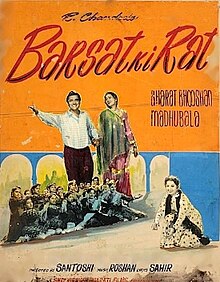Barsaat Ki Raat
| Barsaat Ki Raat | |
|---|---|
 Theatrical release poster | |
| Directed by | P. L. Santoshi |
| Screenplay by | P. L. Santoshi |
| Story by | Rafi Ajmeri |
| Produced by | R. Chandra |
| Starring | |
| Cinematography | M. Rajaram |
| Edited by | P. S. Kochikar |
| Music by | Roshan Sahir Ludhianvi (lyrics) |
Release date | December 9, 1960 |
Running time | 142 min. |
| Country | |
| Language | Hindustani |
| Box office | est. ₹3.5 crore[1] |
Barsaat Ki Raat (lit. 'A Rainy Night') is a 1960 Indian Hindustani-language romantic musical film directed by P. L. Santoshi and produced by R. Chandra. Starring Madhubala, Bharat Bhushan and Shyama, the film is set amongst the erudite and cultured urban Muslims of independent India. It revolves around two lovers Amaan and Shabnam, who strive to be together but the society does not approve of them. The film is considered a defining example of romantic musical film genre.
Upon its release, Barsaat Ki Raat became a blockbuster, the second top-grossing Indian hit of 1960,[1] the twenty-first top-grossing hit of the 1960s at the Indian box office,[2] and one of the top fifty highest-grossing Indian films of all time (when adjusted for inflation).[3]
Over years, Barsaat Ki Raat has emerged as a cult classic, and the three qawwalis featured in its soundtrack (composed by Roshan) continue to be widely popular and imitated. Though Madhubala was extensively praised by critics for her performance, but the film turned out be one of her last films.
Themes
The story features a number of innovative themes while maintaining the basic form of a love story. It has particularly strong female characters who are independent-minded and choose their own loves and destiny. Conflicts are not so much between the wishes of the parents and children about whom the children will marry, as is a common theme in Indian movies, but on the more complex level of conflicts among the main characters and the duplicitous signals men and women send each other. The movie glorifies the lives of "singing girls" not often regarded highly in Indian society. Although it is set with Muslim characters, the movie seamlessly shows the universality of sensual love.
Synopsis
This section is empty. You can help by adding to it. (March 2020) |
Cast
- Bharat Bhushan as Amaan Hyderabadi / Mirza Lakhnauwi
- Madhubala as Shabnam
- Shyama as Shama
- Ratna Bhushan as Shabab, Shama's Sister
- K. N. Singh as Inspector Khan Bahadur (Shanam's Father)
- Mumtaz Begum as Begum Khan Bahadur (Shabnam's Mother)
- Chandrashekhar as Inspector Shekhar (Aman's Friend)
- Baby Shobha as Razia (Shabnam's Sister)
- Peace Kanwal as Barrister Aftab Ahmed
Soundtrack
The soundtrack of Barsaat Ki Raat was composed by Roshan, and lyrics were penned by Sahir Ludhianavi. It was the second best-selling soundtrack of 1960, after Mughal-e-Azam. The soundtrack features three qawwalis, and these qawwalis were one of the major reasons of film's success. Rediff.com, calling the film's music its lifeline, had placed "Na To Karavan Ki Talash Hai" at the second place in the "Bollywood's Top 10 qawwalis."[4]
| # | Song | Singer |
|---|---|---|
| 1 | "Maine Shayad Tumhe Pehle Bhi Kahin Dekha Hai" | Mohammed Rafi |
| 2 | "Maayus To Hoon Vaade Se Tere" | Mohammed Rafi |
| 3 | "Zindagi Bhar Nahin Bhoolegi Woh Barsaat Ki Raat" (Solo) | Mohammed Rafi |
| 4 | "Zindagi Bhar Nahin Bhoolegi Woh Barsaat Ki Raat" (Duet) | Lata Mangeshkar, Mohammed Rafi |
| 5 | "Mujhe Mil Gaya Bahaana Teri Deed Ka" | Lata Mangeshkar |
| 6 | "Na To Karvan Ki Talash Hai" (Yeh Ishq Ishq Hai) | Asha Bhosle, Sudha Malhotra, Mohammed Rafi, Manna Dey, S. D. Batish |
| 7 | "Nigah-e-Naaz Ke Maaron Ka Haal Kya Hoga" | Asha Bhosle, Sudha Malhotra, Shankar Shambhu, S. D. Batish |
| 8 | "Ji Chahta Hai Chum Loon Teri Nazar Ko Main" | Asha Bhosle, Sudha Malhotra, S. Balbir, Bande Hassan |
| 9 | "Garjat Barsat Saawan Aayo Re" | Suman Kalyanpur, Kamal Barot |
Box office
Barsaat Ki Raat was the second highest-grossing film of 1960 after Mughal-E-Azam, which also starred Madhubala. The film was a major box office success; it grossed ₹3.5 crore with a profit of ₹1.75 crore. It was labelled a "blockbuster" and when adjusted per inflation, its gross was equivalent to ₹701 crore in 2016.[1]
In popular culture
Buffy Sainte-Marie, a Canadian singer covered the song "Maayus To Hoon Vade Se Tere" from the movie, which she called the track "Mayoo Sto Hoon". The song was released on her debut album, It’s My Way!, in 1964.
References
- ^ a b c "BoxOffice India.com". 12 February 2010. Archived from the original on 12 February 2010. Retrieved 6 October 2020.
- ^ "Boxofficeindia.com". web.archive.org. 24 September 2011. Retrieved 27 November 2020.
- ^ "Worth Their Weight In Gold! | Box Office India : India's premier film trade magazine | Bollywood news, reviews, interviews, box office collection". web.archive.org. 3 November 2011. Retrieved 27 November 2020.
- ^ "Bollywood's Top 10 Qawwalis!". Rediff. Retrieved 8 October 2020.
